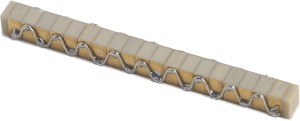Apr 28 2009
Ultrafast lasers benefit from Noliac Motion's 3x3 mm 60V piezoelectric stack actuators as these are ideal for compact designs requiring extremely short time scales or extremely high powers.

Ultrafast lasers are used in many areas such as medical and life-science diagnostics, precision measurement, sensing, optoelectronic testing, clocking and switching, frequency conversion and many other applications.
Smallest man-made structures
With the aid from a small piezoelectric actuator stack, a pulsed laser concentrates its energy into brief bursts. An ultra fast laser produces fantastically short bursts in which the intensity and power of the pulses can reach mind-boggling levels.
Because the pulses happen so quickly, the effects are concentrated in time. This gives ultra fast lasers valuable properties that their slower predecessors do not have. They can, for instance, cut something out before the energy from the pulse gets a chance to heat up and possibly damage the surrounding area.
This means ultra fast lasers are better at such jobs as cutting and welding, eye surgery and creating some of the smallest man-made structures on the surface of semiconductors
Ring or plate stacks
Piezoelectric plate stacks (SCMAP) can be made down to 3x3 mm in base and with the height applicable for the specific application. Full performance is achievable down to 60V.
If more force is required, piezoceramic ring stacks (SCMAR) is an excellent alternative.